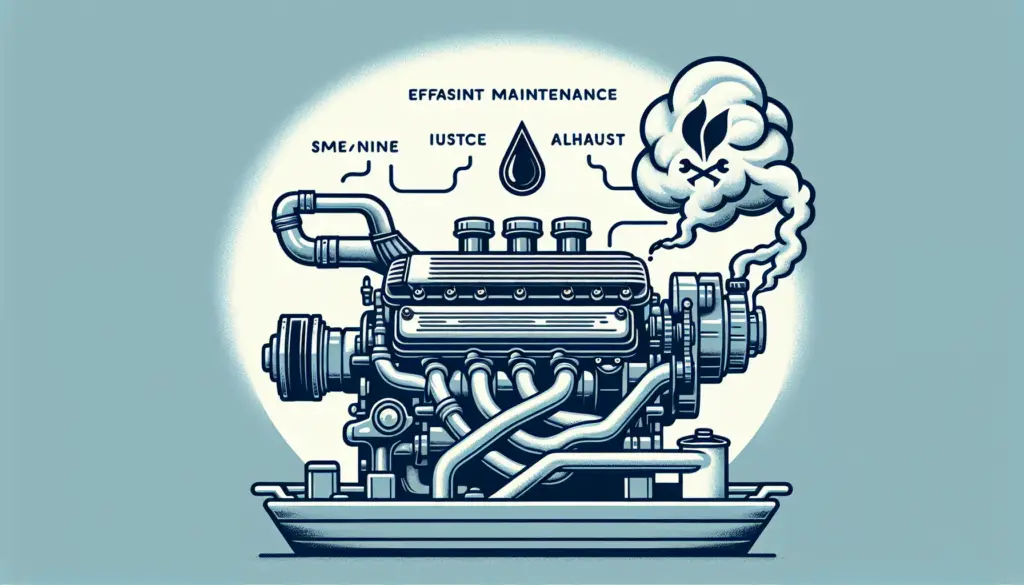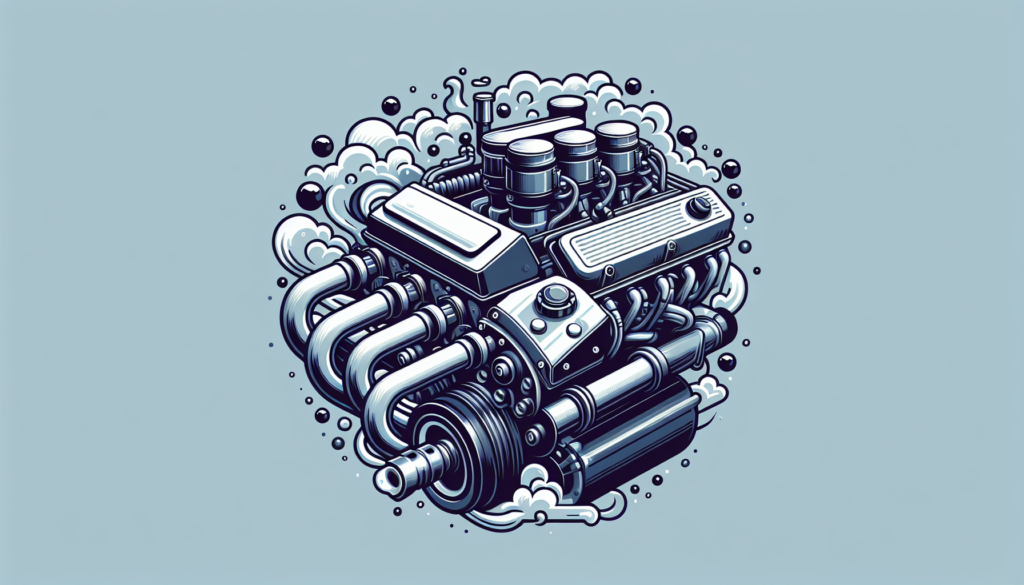Imagine you’re out on the open water, the sun warming your skin and the wind rippling through your hair. Your trusty boat glides effortlessly across the surface, giving you the freedom to explore. However, with that freedom comes a responsibility to the environment. “How to Properly Maintain Your Boat Engine to Minimize Pollution” provides critical insights and tips on how to ensure your boat engine is running efficiently and causing minimal impact on our precious aquatic ecosystems. From choosing the right engine and fuel, to regular maintenance and responsible disposal of waste, this article offers invaluable advice for every responsible boat owner out there.

Understanding The Impact of Boat Engine Pollution
The impact of boat engine pollution is something every seafarer should be cognizant of. The open seas may seem immune to the pollution issues that plague our land and our air, but the reality is they’re just as vulnerable. Understanding this impact is a necessary step for anyone who loves the ocean and wants to keep it healthy for future generations.
Importance of Minimizing Boat Pollution
Flourishing marine life, clear blue water, vibrant underwater habitats – these are the aspects of our oceans that make them so captivating. But, this natural beauty is at risk due to rampant boat pollution. It’s paramount to recognize the importance of minimizing boat pollution. Not only does water contamination harm the biodiversity of our waterways, but it also affects the health of our planet as a whole. If we aim to preserve the beguiling charm of our oceans, minimizing boat pollution becomes a ‘must’, not a ‘maybe’.
Environmental and Health Impacts of Watercraft Emissions
Watercraft emissions pose significant threats to both our environment and our health. Powerful toxins released from boat engines can damage biodiversity, disrupt aquatic food chains, suffocate marine life, and increase the acidity of oceans. On top of causing environmental turmoil, these toxic emissions can also pose severe risks to human health, including respiratory problems and potential long-term damage to the central nervous system.
Legal Implications of Excessive Boat Pollution
Beyond the moral and environmental considerations, there are also legal implications of excessive boat pollution to understand. Strict regulations are in place around the world to limit the emissions derived from watercraft. Falling foul of these laws can lead to heavy fines, vessel confiscation, or even jail time. Your love for the open seas must go hand in hand with a respect for the rules that preserve them.
Fundamentals of a Boat Engine
As a boat owner, having a basic understanding of your boat engine is vital. Getting to grips with how your engine works can play a crucial role in minimizing the environmental impact of your maritime adventure.
Basic Parts of a Boat Engine
The boat engine – the powerhouse of your vessel. But, what components does this powerhouse contain? Essentially, a typical boat engine consists of a combustion chamber where the fuel burns, a cooling system to maintain an optimal temperature, an exhaust system that vents out the emission, and a lubrication system that keeps all moving parts in check.
Functionality of Different Boat Engines
The way different boat engines function can vary widely. From simple outboard motors to complex diesel engines, the mechanism of each type contributes differently to water pollution. Understanding their functionality can help you choose an engine that aligns better with your commitment to minimizing environmental impact.
Common Pollutants from Boat Engines
Boat engines typically emit pollutants like carbon monoxide, hydrocarbons, and nitrogen oxides, among other harmful substances. The carbon monoxide produced can lead to an increase in greenhouse gases, resulting in global warming. Hydrocarbons and nitrogen oxides, on the other hand, contribute to water eutrophication and acid rain, respectively.
Using The Right Fuel For Your Boat
Choosing the right fuel is pivotal when it comes to reducing the environmental impact of your vessel. The type of fuel you use can make a significant difference to the emissions your boat engine releases into the environment.
Types of Boat Fuel
There are several types of boat fuel to choose from – diesel, gasoline, and biofuels being the most common. The choice of fuel largely depends on the type of engine your boat has. While diesel and gasoline are widely used, they are also major pollutants. Alternatively, biofuels could offer a more environmentally friendly fuel option that degrades more rapidly in water.
Selecting Environmentally Friendly Fuel Options
When selecting environmentally friendly fuel options, look for fuels with low sulfur content and lower carbon footprints. This could be biofuels or other green alternatives that emit fewer greenhouse gases. Trading in traditional fuels for cleaner alternatives can be one significant step towards curbing boat engine pollution.
Proper Fueling Techniques
Following proper fueling techniques also contributes to reducing pollution. Try to avoid overfilling the tank and make use of devices that catch spills. Quick to clean up any leaks and dispose of used fuel safely, following all local environmental guidelines.
Regular Boat Engine Maintenance
Keeping your boat engine in top shape is essential to minimizing emissions. Regular check-ups and maintenance can lead to improved performance, lower fuel consumption, and reduced pollution.
Importance of Regular Check-ups
Regular check-ups can identify potential problems early on, preventing more serious damage down the line. These check-ups should center around the engine’s oil, filters, belts, cooling system, and other factors that affect its performance.
Preventing Leaks and Spills
Preventing leaks and spills is a crucial part of boat engine upkeep. Regular inspections, using quality parts, and taking immediate action in case of a leak can prevent pollutants from entering the water.
Scheduling Routine Inspections
Routine inspections by professionals can ensure your boat engine is working efficiently. An expert can identify issues that may not be immediately apparent and provide detailed maintenance advice to keep your boat in optimal condition.

Emission Control with Proper Tuning
A well-tuned engine can drastically cut down on boat emissions. Identifying symptoms of a poorly tuned engine, knowing the steps for proper tuning, and realizing the benefits of a well-tuned engine are all key parts of emission control.
Symptoms of A Poorly Tuned Engine
On a boat, a poorly tuned engine can display a range of symptoms. These could include difficulty starting the engine, a decrease in fuel efficiency, excessive smoke, or the engine running roughly or stalling. Ignoring these signs can lead to escalated problems and increased emissions.
Steps for Properly Tuning Your Boat’s Engine
Properly tuning your boat’s engine often involves multiple steps – including adjusting the fuel/air mixture, balancing the engine’s speed, ensuring the spark plugs are cleaned and appropriately gapped, and more. Although the process can be complex, the payoff in terms of reduced pollution and improved performance is significant.
Benefits of A Well Tuned Engine
A well-tuned engine not only reduces emissions, but it also enhances fuel efficiency, extends the engine’s lifespan, and provides a smoother sailing experience.
Propeller and Hull Maintenance
An often overlooked part of maintaining a boat in an environmentally conscious way is looking after the propeller and the hull. Believe it or not, the condition of these two parts can significantly impact emissions.
Effect of Propeller and Hull Condition on Emissions
A propeller coated in marine growth or a hull covered in barnacles can put extra strain on the engine, increasing fuel consumption and emissions. A clean hull not only reduces resistance but also enhances speed and increases fuel efficiency.
Cleaning and Maintaining the Hull
To clean and maintain the hull, opt for regular checks and cleanings, utilizing environmentally friendly products when you do. It’s wise to be proactive – as too long between cleanings can lead to stubborn marine growth that is hard to remove.
Proper Propeller Maintenance and Replacement
As for the propeller, regular inspections for damage, thorough cleanings, and timely replacements if necessary can ensure your boat propeller performs optimally and contributes to your overall effort to reduce pollution.
Proper Boat Engine Storage
Storing your boat engine properly when not in use might not seem vital, but it’s integral to preventing pollution and increasing the longevity of your boat.
Preparing the Engine for Long Term Storage
Preparing your boat engine for long-term storage usually means fully draining the fuel system, cleaning the engine with special solutions, protecting it from corrosion, and storing it in a cool, dry place where no pollutants can leak out.
Avoiding Potential Pollution During Storage
Ensuring pollutant-absorbent materials are near at hand to catch any potential leakage and using storage methods that are kind to the environment helps avoid potential pollution during storage.
Importance of Proper Engine Storage
Proper engine storage keeps your engine in good condition, minimizing the chances of leaks and spills once you’re out on the water again. It’s a more sustainable choice for your engine in the long run.
Implementing Renewable Energy Sources
In the quest to reduce boat engine pollution, adopting renewable energy sources can be a game-changer. With advancements in technology, sources like solar and wind power are growing increasingly viable options for powering boats.
Using Solar and Wind Power on Boats
Solar panels and wind turbines can be installed on boats to generate power for running onboard systems or even to power the boat itself. Using such renewable energy sources significantly reduces the amount of traditional fuel needed, thereby minimizing pollution.
Advantages of Electric Boat Engines
Electric boat engines are another excellent alternative to conventional motors. They produce zero emissions, operate virtually silently, require less maintenance, and use renewable electricity, making them a sustainable choice for the environmentally cautious boater.
Effectiveness of Hybrid Engines on Watercraft
Hybrid engines, which combine a combustion engine with an electric motor, have proven to be a highly effective and efficient solution. They allow boaters to switch between modes, using optimal energy sources depending on the circumstances, which can culminate in less overall pollution.
Adopting Sustainable Boating Practices
Sustainable boating practices span beyond the engine and dip into everyday habits and choices on your watercraft.
Eco-Friendly Boating Habits
adopting eco-friendly boating habits can make a big difference. This includes simple actions like not throwing garbage overboard, recycling whenever possible, using less water, and only using the engine when necessary.
Choosing Green Products for Boat Maintenance
When maintaining your boat, opt for green products. Choosing environmentally friendly cleaners, paints, and lubricants can significantly lessen the chemical pollution that originates from your watercraft.
Implementing Waste Reduction and Recycling Onboard
Implementing waste reduction and recycling onboard your vessel can keep the amount of garbage you create to a minimum. Consider installing a recycling station, going paperless for navigation, and buying items with minimal packaging to avoid generating unnecessary waste.
Educating Others About Boat Pollution
Now you’re enlightened about boat pollution and how to manage it; it’s important also to propagate this knowledge among other water enthusiasts.
Sharing Information with Fellow Boaters
Sharing information with your fellow boaters, whether in formal settings or during casual conversations, can help disseminate knowledge about boat pollution and the ways to combat it.
Participating in Community Clean-Up Events
Active participation in community clean-up events not only promotes cleaner waterways but can also provide ample opportunities to engage with others about the importance of sustainable boating practices.
Promoting Sustainable Boating Practices
Promoting sustainable boating practices within your community can have a ripple effect, influencing other boaters to tread lighter and consider the impact of their actions. Small efforts like arranging informative talks or simply discussing sustainable practices with friends can eventually lead to a significant wave of change.
The wave of change begins with you and your boating practices. The seas are a joy to explore, and it is our duty to ensure they remain so for future generations. Every effort counts, and every sustainable step you take on your boating journey contributes to a healthier, cleaner, and more vibrant world of waterways.


[…] An engine’s oil and filter play a significant role in its performance. Changing them regularly ensures that your engine functions more efficiently and lasts longer. […]